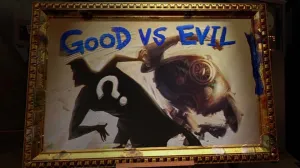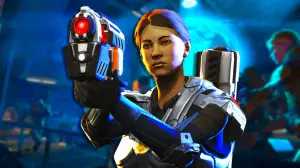
Spider-Man: Far From Home made it clear that its eponymous hero hasn’t lost an ounce of box office charm last weekend. The film reaped in big profits and excellent reviews, showcasing Tom Holland’s Spider-Man as the heir apparent to Robert Downey Jr.’s Iron Man, both in plot and studio planning. It was a passing of the torch that seemed to announce: “Don’t worry. Spider-Man is the hero we need now.” That might be the intended message, but it’s not one that is particularly well supported by the text of the film or the overall franchise. While the very specific threat posed in Spider-Man: Far From Home provides ample opportunities for Spidey to save the day, it never addresses the elephant in the room. Taking a step back and looking at the big picture reveals an unexpected hero in the form of Mysterio, the character who actually provides a solution in spite of his copious flaws.
Videos by ComicBook.com
It should probably go without saying, but this argument features copious spoilers for Spider-Man: Far From Home and other movies in the Marvel Cinematic Universe (MCU). If you have not seen any or all of the most recent films in this franchise, then here’s your warning:
*SPOILER WARNING*
With that out of the way, let’s dive into the real enemy in Spider-Man: Far From Home.

The Greatest Threat in the MCU
It was The Avengers that first established the greatest threat to Earth in the MCU’s ongoing narrative and I’m not referring to the post-credits scene featuring Thanos. Towards the end of the film as it becomes clear that Loki’s invasion force will be defeated, a new antagonist appears in the form of the World Security Council. This group of literal shadowy figures make the decision to drop a nuclear weapon on New York City, rather than provide time for the Avengers to repel Loki or evacuate residents. It is the one missle that makes its way into the city that forces Iron Man to nearly sacrifice his life in the film’s climactic moments. This is the conflict that establishes why the Avengers were created by Nick Fury as he understood the status quo was incapable of handling complex and overwhelming threats, like alien invasions and Norse gods of mischief.
The issue posed in this moment and throughout many MCU movies is one in which humanity threatens itself by leaving too much power with only a handful of people. Taken as a whole these many individual conflicts become representative of a core conflict in our culture: the post-9/11 security state. The issue is a nuanced, multi-faceted one, but it’s not difficult to see the many ways in which the MCU consistently returns to this theme.
Captain America: The Winter Soldier offers a prime example, focusing on how a massive governmental surveillance and intelligence collecting operation will ultimately be turned against the people. Iron Man 3 and The Avengers: Age of Ultron both emphasize the problems with new technologies quickly being weaponized by the military-industrial complex with the creation of super soldiers and artificial intelligence, respectively. Even Spider-Man’s first outing touches on this as he’s forced to confront the consequences of a global arms race in which nation-states and criminals alike are all seeking the best new weaponry. Iron Man 2, Ant-Man, Captain America: Civil War, and others all continue to address this topic in different fashions.
The essential factors of this problem remains consistent throughout, even as different perspectives are examined. Too much power, too little oversight, and bad actors all make humanity its own worst enemy, leaving various Avengers in position to barely save the day before the cycle repeats itself. That ongoing struggle is at the heart of Spider-Man: Far From Home.

Inevitable Power Struggles
Peter Parker and Quentin Beck enter Spider-Man: Far From Home in very different roles. Parker is a sixteen-year-old student, recently returned to life, who has inherited the E.D.I.T.H. technology from his recently-deceased mentor Tony Stark. E.D.I.T.H. functionally acts as the keys to Stark’s kingdom; it allows Peter to instantly access anyone’s private data, engage in global satellite surveillance, and launch a seemingly endless supply of deadly drones from space that are capable of destroying entire cities. Beck, acting as Mysterio, is aware of the massive power that he and his fellow conspirators have left in the hands of a few individuals, like Stark and Parker. In return for creating such marvels, they have all experienced various forms of shame and embarrassment, not to mention job loss. They know how much power Peter has and believe themselves better suited to handle that power.
This is the central struggle of Spider-Man: Far From Home. It’s not a movie about stopping a nefarious plot, but a power struggle over which individual or small group of actors should control technology so powerful as to threaten all of humanity. In this regard, both Parker and Mysterio fail to meet the expectations of a protagonist, as they both seek to control E.D.I.T.H. themselves. In spite of more than a decade of history that shows even well-intentioned actors like Nick Fury and the Global Security Council are liable to fail in managing technologies less powerful than this one, Parker (and Stark, posthumously) seek to keep it in the hands of a few individuals with little to no oversight. Parker’s own actions in Spider-Man: Far From Home make it clear he is wildly unsuited to the responsibility, even when compared to the others mentioned here, as he almost accidentally assassinates a classmate and hands over the power to Mysterio who is willing to raze London and murder children to control it. The only thing that is clear by the film’s end is that as long as this sort of power exists in the world, it will always be a threat to the planet, no matter how morally pure its wielders may seem.

A Necessary Solution
Mysterio’s plan to obtain and control E.D.I.T.H. is not what makes him the hero of Spider-Man: Far From Home. He shows himself to be every bit as flawed as HYDRA, the World Security Council, and others who were willing to sacrifice human life so they could rule. Spider-Man is hardly a superior substitute, though, as shown by the consequences of his failures (including loss of life in multiple major cities) in just the first few weeks of being set in charge of this much power. Mysterio makes himself the hero of this movie when he breaks this cycle in the film’s first post-credits sequence.
While it appears that Mysterio’s death at the end of the film is authentic, he delivers one final surprise days after his passing in the form of a video message. He reveals to the world that Peter Parker is Spider-Man, and makes sure that such tremendous power will no longer be unaccounted for. Even if Mysterio is driven primarily by revenge, his final actions ultimately benefit the greater good. If Spider-Man retains E.D.I.T.H., then both the public and governments will be aware of who to hold accountable for its use. Mysterio’s final lie that Spider-Man killed him (despite Mysterio himself being at fault) provides good reason for those same forces to be suspicious. While Spider-Man didn’t murder Mysterio he had already absued E.D.I.T.H.’s immense powers in a deeply irresponsible and sometimes deadly fashion.
None of this implies Spider-Man is the villain of Spider-Man: Far From Home. The “villain” in this case is not any one individual, but the continual destruction of the globe by a handful of individuals who could not be held accountable for their actions. If Spider-Man is to continue to possess such tremendous power, then he has a responsibility to be transparent and accountable for its use. That can only be accomplished when government agencies, journalists, and an entire democratic population have the knowledge of who is doing what. While Mysterio’s final message will certainly wreak havoc on Spider-Man’s life, it makes the world a much safer place by finally making sure that the super-powered security state will be overseen by the people it has threatened for years, instead of any one person.








